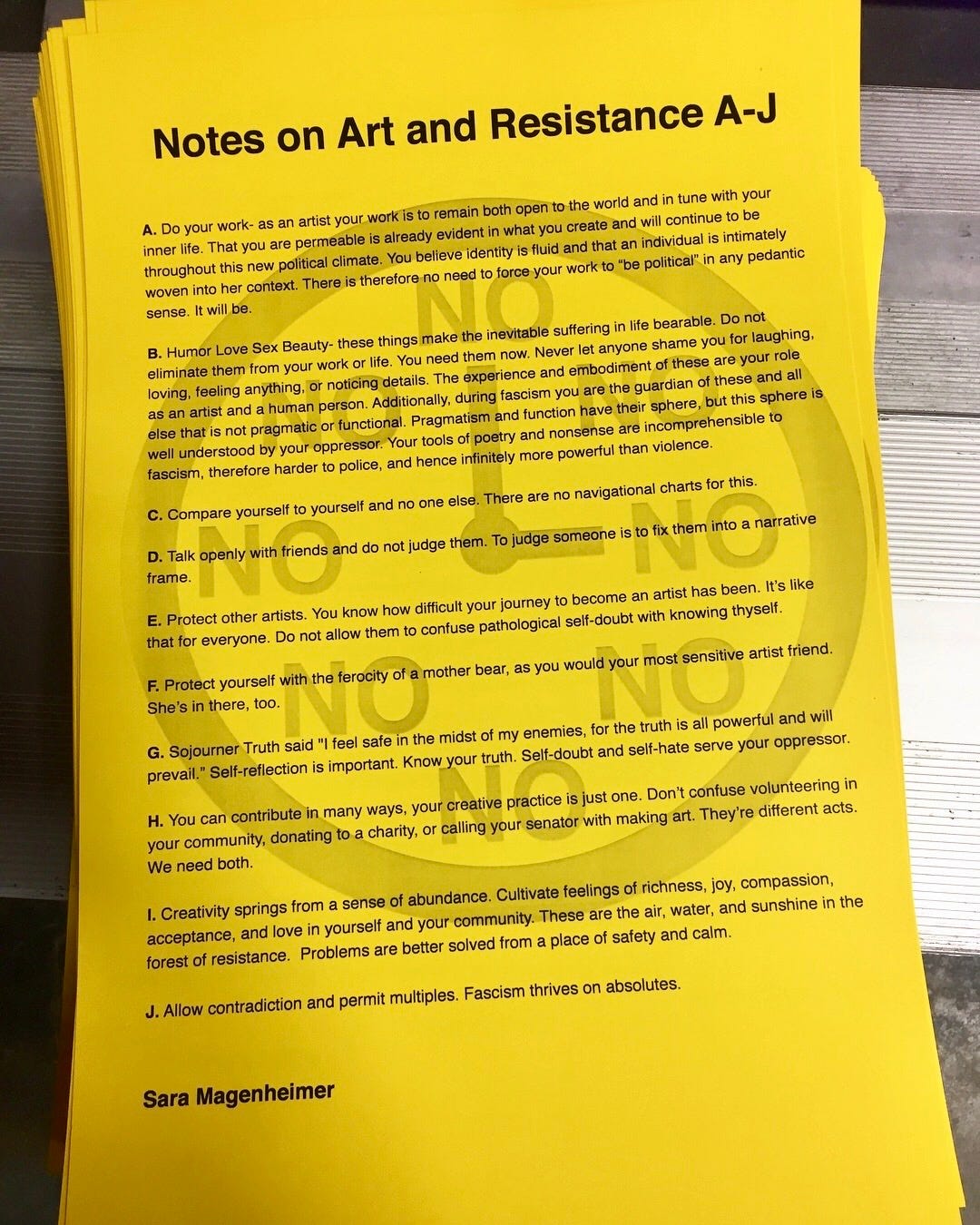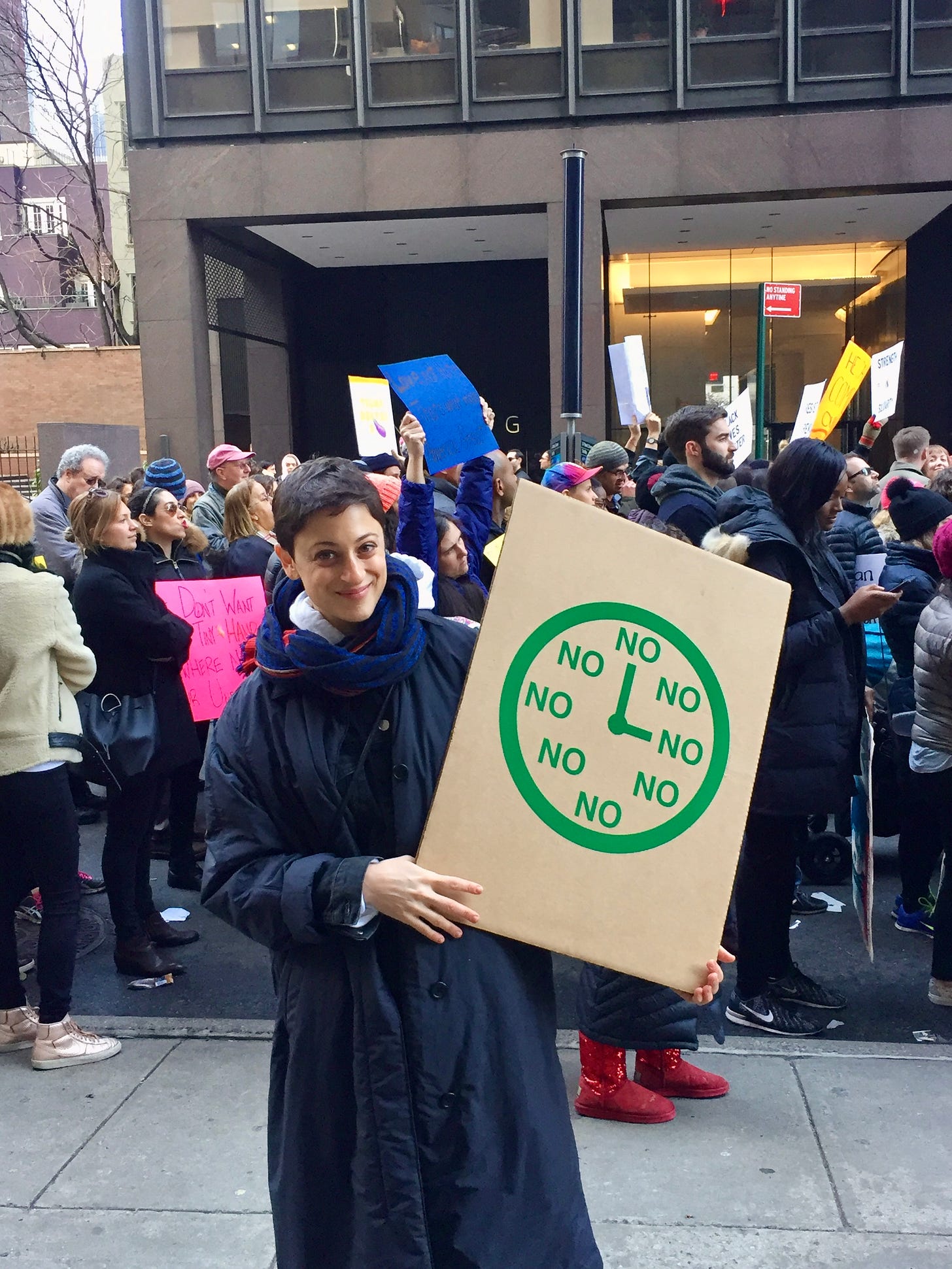Notes on Art and Resistance A-Z (2017)
No no no no no no no no no no no no no no no no no etc.
A stack of posters printed and distributed at PICA during a performance in 2017
I have been thinking a lot about 2017 as I find myself retreading familiar territory in many areas of my life, particularly in my classroom. Yet, the entire socio-political landscape has changed, so much in my personal life has changed, and I feel unmoored and overwhelmed. I wrote Notes on Art and Resistance A-Z in 2017 as a reply to the many students who asked me why and how to make art under the first Trump presidency, sometimes implying that it was morally wrong to do so in times like these that seem to require immediate, urgent action.
No Clock image in its first iteration as a protest poster in 2017
It is tempting to see suffering as superior to joy, or even to see pleasure as a crime when there’s so much sadness and grief. This is misguided. We absolutely need to enjoy the life we want so much to protect, if for no other reason than the fact that it puts gas in our emotional tank so we can play the long game, fight the long fight. I am deeply invested in the power of poetics and nonsense. At the same time, I want to stay informed and crystal clear on what is going on in order to direct my limited resources (time, attention, energy) accordingly.
Like any big project the only way to start grasping its scope, and orient ourselves in relationship to it, is to break it down into digestible pieces. That step itself is an act of resistance to the powerlessness, paralysis and overwhelm that people in power want us to feel, which is no accidental bi-product; it’s a strategy. This is what I’m doing: informing myself, unbraiding the strands that seem so tangled. It’s calming. It helps reclaim a sense of personal agency. I have so little free time and even less money: I take care of my young child, I teach at a state school. I’m sick a lot. I’m frequently exhausted. I use what time remains to do things that keep me grounded: art, music, writing. I hike, often alone, which I privately think of as “going to church.”
It’s funny that I would use this metaphor, since refusing compulsory church attendance was my first life-changing act of resistance. The dawn of puberty brought a new awareness; bumper stickers that yelled “CONTRACEPTION DEGRADES WOMEN” were not something I could ignore as I walked from the parking lot to the church in our working-class Philadelphia suburb. My parents pleaded with me to continue attending mass, but they raised me to be honest about my beliefs. I explained this contradiction: if I were to continue going I would be faking it. I wrote them an essay on why I felt so passionately about women’s reproductive rights, why I refused to be complicit in any institution with an anti-choice agenda. It worked.
Looking back on this moment in my life, I see how much the adversity taught me and I’m grateful for the lessons. When you are a teenaged girl, working-class, or feel disempowered for any number of legitimate reasons, words can be enough of a lever to change your perspective and the perspective of those around you. It can be sufficient to simply say “No.”
Poster at a protest in NYC 2017
The text below is attached as a PDF and it is also downloadable from the New Museum’s archive here.
Notes on Art and Resistance A-Z
A. Do your work. As an artist your work is to remain both open to the world and attuned to your inner life. That you are permeable is already evident in what you create and will continue to be during this new political climate. You believe identity is fluid and that an individual is intimately woven into her context. It is futile to force your work to “be political” in any deliberate sense. It will be.*
B. Humor, love, sex, beauty: these things make the inevitable suffering in life bearable. Do not eliminate them from your work or life. You need them now. Never let anyone shame you for laughing, loving, feeling anything, or noticing details. The experience and embodiment of these are part of your role as an artist and a human person. You are the guardian of these and all else that is not pragmatic or functional. Pragmatism and function have their sphere but this sphere is well understood by that which aims to oppress you. Your tools of poetry and nonsense are incomprehensible to your oppressor, difficult to police, and therefore infinitely more powerful than violence.
C. Compare yourself to yourself and no one else. There are no navigational charts for this. Try especially to avoid comparing your soupy insides with someone else’s slick veneer.
D. Talk openly with friends and do not judge them. To judge someone is to pin them into a narrative. Leave space for their story.
E. Protect other artists. You know how difficult your journey to become an artist has been. It’s like that for everyone. Never allow them to confuse pathological self-doubt with an earnest search for self-knowledge.
F. Protect yourself with the ferocity of a mother bear, as you would your most sensitive artist friend. Observe and pick up “vibes.”
G. Self-reflection is important. Know your truth. Self-doubt and self-hate serve your oppressor.* Lure your demons from the shadows and name them.
H. You can contribute in many ways; your creative practice is just one. Don’t confuse volunteering in your community, donating to a charity, or calling your senator with making art. They’re different acts. We need both.
A* “Calling something ‘political’ and thinking of it as separate is just an excuse for not thinking about it.”
- Vicki Aspinall of The Raincoats
G* “I feel safe in the midst of my enemies, for the truth is all powerful and will prevail.”
- Sojourner Truth
I. Creativity springs from a sense of abundance. Cultivate feelings of richness, joy, compassion, acceptance, and love in yourself and your community. These are the air, water, and sunshine in the forest of resistance. Problems are better solved from a place of safety and calm.
J. Heighten contradiction and permit multiples— that’s where the juice is. Fascism thrives on absolutes. Resist coherence.
K. Nobody cares what you do, specifically. The people who love you want to see you thrive. It makes no difference to them whether you make a drawing or sing a song. Decide to stop suffering. If creating is a joyless endeavor, what is the point of fighting for your right to do so? Ecstatic dancing and joyful singing are essential food.*
L. Unbroken and broken rules are equally impermanent. It’s action that matters. Make a new rule and immediately break it. Make another, more difficult to break, then break it. And so on. Continual arrival is the thing.
M. Learn what you have to offer and offer it. Do this unconditionally. Disrupt your dependency on result, outcome, and reward.
N. Stay loose. Your identity is partially contingent on those around you. During times of social upheaval they, and therefore you, are in flux. Your work is also in flux. (Note: your identity and your work are not the same; to think so is the artist’s egotism.) However, just as you shouldn’t rush the continuous arrival of your own identity, do not rush your work to its destination. A more stable time is inevitable. Enjoy rocking on this boat for now. Notice how your view is changing. Remain flexible amidst this motion.
O. Kindness is strength. Keen awareness of yourself, your friends, your family, and your culture is your job. You are a sentry. All who equate sensitivity with weakness reveal their malignant values: somnolence, sameness, and violence.
P. It is time to be honest. Demystify your work and life. Reveal how you do things. Be like inside-out clothes and show your seams.
Q. Take risks. Do not become a passive echo of the sudden changes in your political sphere.
K* “Because if it wasn’t for the music, oppression and taxes would kill you ... when you hear dub you hide from the fuckers there.”
- Lee “Scratch” Perry
R. Make your own statements in your own voice. Pick a landmark that represents the limit of your field and see how much you have to say on your way towards it. Avoid responding to terms set by others whom you don’t necessarily respect, or even know.
S. Understand systems. Understand our desire to externalize what we find distasteful about ourselves. Understand your secret shames. Arbitrary attempts to help others will not cement your sense of worthiness. Help is the fraternal twin of control.
T. Don’t confuse self-care for acts that insulate you from feeling pain, discomfort or seeing your imperfections. Your discomfort is a compass, pointing you towards what needs to change within yourself and your culture. If you really feel broken, unplug yourself for a while. Eventually you will begin to work again.
U. If you want to live in a world that embraces the weak and loves them, reveal your weakness in the hope that it will be embraced and loved. If it isn’t, know you have the strength to embrace those whose weakness prevents them from doing so.
V. Feel around in the dark for threads. Follow these to the hem of the vast form you don’t know. Create activity there—don’t call it work. (As an experiment try eliminating that word from your vocabulary.) When you get resources you need, don’t be intimidated. Express your gratitude by eating them up.
W. It is an artist’s job to address things that don’t have easy answers, even to nurse unanswerable questions. In a time when honest discourse and dialogue are being challenged it is our task to resist and decry the attraction to slickness, tidiness, easy resolution, and nuancelessness. Avoid rushing to conclusions that numb the unease of the unknown.
X. Words are not neutral. Words are born of conflict and misunderstanding. Create a vocabulary that says what you want to say the way you want to say it. Kill your words and make up new ones. Draw new language out of yourself. Imagine your audience is absolutely on board with your every move. Do not even consider them.
Y. Stay slippery. Resist attachment. Check up on your established codes and make sure they still make your point. Words get co-opted, rehabilitated, outmoded, appropriated, and perverted. Don’t fall in love with your slogan, fall in love with what it does.
Z. Nobody just is. If you feel some way and want to feel another you have to try to feel differently. Everybody is trying to be the way they are, whether consciously or unconsciously. We never see the roots from above ground, but we all know they’re there.
Sara Magenheimer 2017







Thank you for sharing this- very inspiring!